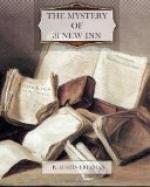“Ah,” my colleague remarked, “that is a little reminder. We will put it on the mantelpiece for Polton to collect and you shall give me a full account of your further adventures in the wilds of Kennington. That was a very odd affair. I have often wondered how it ended.”
He drew our two arm-chairs up to the fire, put on some more coal, placed the tobacco jar on the table exactly equidistant from the two chairs, and settled himself with the air of a man who is anticipating an agreeable entertainment.
I filled my pipe, and, taking up the thread of the story where I had broken off on the last occasion, began to outline my later experiences. But he brought me up short.
“Don’t be sketchy, Jervis. To be sketchy is to be vague. Detail, my child, detail is the soul of induction. Let us have all the facts. We can sort them out afterwards.”
I began afresh in a vein of the extremest circumstantiality. With deliberate malice I loaded a prolix narrative with every triviality that a fairly retentive memory could rake out of the half-forgotten past. I cudgelled my brains for irrelevant incidents. I described with the minutest accuracy things that had not the faintest significance. I drew a vivid picture of the carriage inside and out; I painted a lifelike portrait of the horse, even going into particulars of the harness—which I was surprised to find that I had noticed. I described the furniture of the dining-room and the cobwebs that had hung from the ceiling; the auction-ticket on the chest of drawers, the rickety table and the melancholy chairs. I gave the number per minute of the patient’s respirations and the exact quantity of coffee consumed on each occasion, with an exhaustive description of the cup from which it was taken; and I left no personal details unconsidered, from the patient’s finger-nails to the roseate pimples on Mr. Weiss’s nose.
But my tactics of studied prolixity were a complete failure. The attempt to fatigue Thorndyke’s brain with superabundant detail was like trying to surfeit a pelican with whitebait. He consumed it all with calm enjoyment and asked for more; and when, at last, I did really begin to think that I had bored him a little, he staggered me by reading over his notes and starting a brisk cross-examination to elicit fresh facts! And the most surprising thing of all was that when I had finished I seemed to know a great deal more about the case than I had ever known before.
“It was a very remarkable affair,” he observed, when the cross-examination was over—leaving me somewhat in the condition of a cider-apple that has just been removed from a hydraulic press—“a very suspicious affair with a highly unsatisfactory end. I am not sure that I entirely agree with your police officer. Nor do I fancy that some of my acquaintances at Scotland Yard would have agreed with him.”
“Do you think I ought to have taken any further measures?” I asked uneasily.




